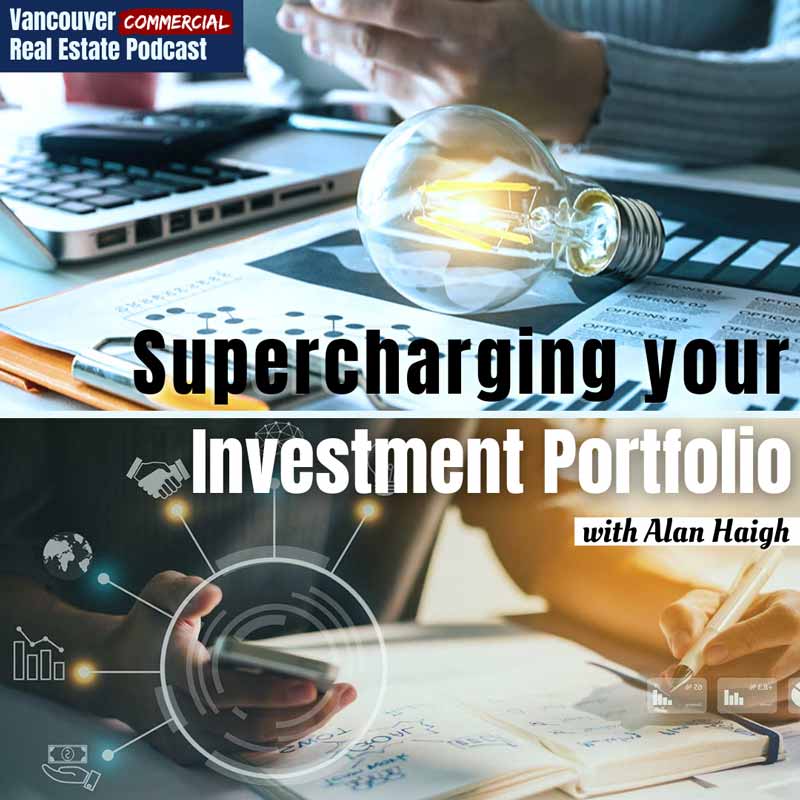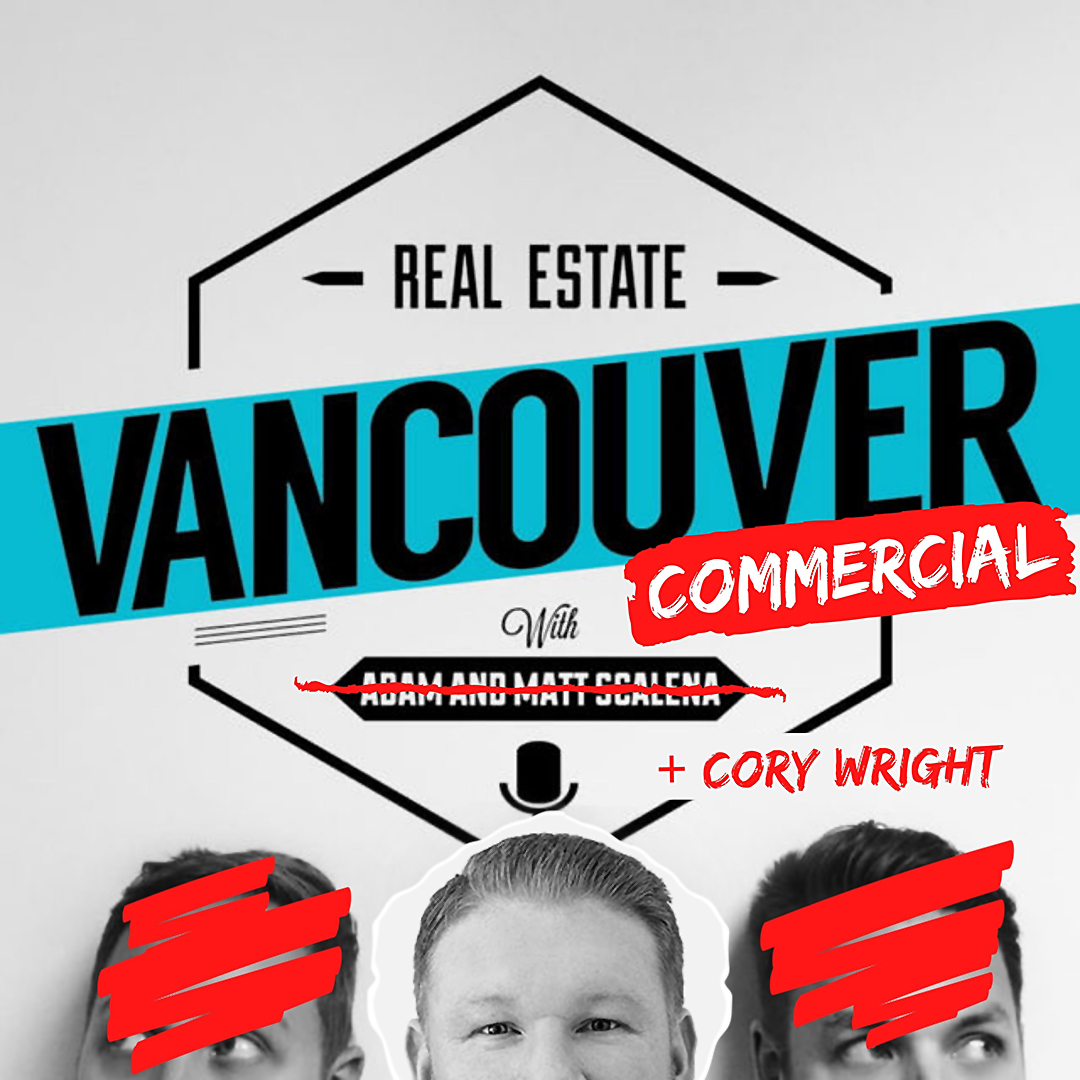
Powered by RedCircle
They’re back! Do you own a property with lots of equity that has built up over the years? Do you want to turn that equity into more properties without having to sell your property? This week, Cory and Matt ring in the New Year with Alan Haigh, managing partner of Impact Commercial Group, one of BC’s leaders in commercial mortgages.
Alan breaks down how you can tap into that equity and turn one property into a thriving commercial portfolio without having to sell your asset. Every expert in real estate uses the power of leverage to build their wealth, so if you own real estate, this is a must-listen episode with advice from one of the best in the business!
Who is Alan Haigh? What is Impact Commercial Group?
I’m the Managing Partner of Impact Commercial Group. We are a commercial mortgage brokerage that works with clients to help them find the best solution. It’s not about rates and fees – it’s about meeting the unique needs of our clients. We also want to provide them with the next steps. It’s a relationship business.
What strategies can you use to build a commercial real estate portfolio?
At Impact, we’re just a small part of the puzzle and we work with a lot of amazing realtors, lawyers and other partners to support our clients. I’d love to pass on some of the lessons we’ve learned from our clients who have grown their portfolios a lot over the last 5, 10, 20 years through refinancing.
How can you use leverage to build your real estate portfolio?
If you buy a $1 million property with a 5% cap rate, you have $50,000 of income to support the mortgage debt. And let’s say you can afford a $700,000 mortgage.
We’ve seen substantial increases in lease rates over the last 10 years. So if your $50,000 in income increases to $75,000, you now have a property valued at $1.5 million. You’ve increased your property value just by increasing your income.
If you keep your mortgage at 70% of the property value, that’s now $1,050,000, which leaves you an additional $350,000 to play with. You can pull that $350,000 out and use it to put a down payment on your next piece of property.
Is 5% cap rate standard? What is the standard cap rate in commercial real estate in BC?
I use 5% because it’s an easy number to calculate. There are lots of different cap rates depending on asset class and geographic areas. We’re seeing 5% cap rates in places like Nanaimo, Victoria and Kelowna. In the Lower Mainland, industrial property is likely in the 2.5% range.
How do you know if you can debt service your mortgage? How much mortgage can you afford?
You divide your net operating income, so $50,000 in the example above, by 12 to figure out your income each month and how much you can afford. Banks will look at debt service coverage; they won’t give you credit for 100% of the income because they need you to have a buffer. For example, if your income is $1, banks could lend up to $0.80. A lot of lenders are at 1.15-1.5% depending on the value of your property’s tenants.
What is the process of refinancing a commercial property?
When you have an income increase, you bring that information to someone like me, your mortgage broker. We’ll get an appraisal done to give you the new value of your property based on your new income. I take that value out to the market and figure out the best fit for you with a new updated solution. That might mean staying with your existing lender or it might mean moving to a lender who is more flexible. You’d then have access to that additional financing based on your property’s equity and improved cash flow.
Lenders love cash flow. If you can get your cash flow up, lenders will flock to you. And once you go from one to two properties, it’s very easy to scale quickly from there. Using the cash flow of properties to support greater financing is a powerful multiplier.
It’s hard to find cash flow in the Lower Mainland. Should you buy commercial real estate in Vancouver?
It’s hard to find good properties in Vancouver and even harder when you have to put 50% down because cap rates are so low. You’re also competing with a lot of sophisticated investors in Vancouver. But if you go outside of Vancouver, you can find a $2 million property with only $500,000 down payment. You can do that in Penticton and a lot of other areas. So we are seeing a migration of people who are getting priced out of Vancouver.
In commercial financing, it’s all about cash flow. If you can find that in Langley, Mission or Surrey, that’s where you go. People are in search of cash flow.
How important is the location of a commercial real estate property to banks and lenders?
Location is very important. We have access to a lot of lenders but let’s not kid ourselves. You can’t get all of your needs satisfied by one lender which is why it’s important to use a broker who can go to the market and find the perfect solution for you.
In smaller markets in BC, you will have less lender interest. You can’t expect to have your biggest and best lenders financing in Prince George. It doesn’t happen the same way as it does in Vancouver.
Does your personal income matter when buying commercial real estate?
Commercial lending is all about the cash flow and the property. Your personal income doesn’t really matter. The leverage on your commercial properties will be based on your lease rates and what that property can support for a mortgage.
However, if you’re in an owner-occupier situation, then it is your business income supporting the mortgage. That’s where working with a mortgage brokerage is helpful. We can ensure your statements reflect what you need to get your financing.
Where should people buy commercial real estate in BC? What commercial asset class should people be buying in BC?
There are an unbelievable amount of buyers out there trying to purchase every asset class in almost every area of BC. We have some incredible geography in BC which is pushing demand. We’re doing work all over the Island, we’re in the Interior and we’re in the North. There are buyers everywhere for everything! There is incredible demand for all types of properties in BC.
In terms of what asset class to buy, everyone is familiar with “beds and sheds” – which is multi-family rental and industrial. But some of my more aggressive clients are getting into the retail play again. Retail has been out for the last couple of years due to covid. But retail is interesting because a lot of these strip malls sit on great locations. So some people are buying retail assets as a covered land play. They’re buying with the intent to develop on the land in 5-10 years.
Where are interest rates going?
Our economy is on the road to recovery. With that, we do see increasing interest rates. I think we’ll see the Bank of Canada moving their overnight rate up over the next year. I would guess we’ll see three quarter point increases over 2022.
I do think the inflation out there is transitory; I don’t think we’ll see it as a mainstay once all the supply chain issues with covid are worked out. The other factor is debt. Everyone is hooked on debt these days. People who are used to 3% interest may get pushed to 4%, which is a 50% increase. They may feel the pain of that, which would limit how far we could increase interest rates.
How do fixed and variable mortgages work in commercial real estate?
In general, most commercial financing is fixed with 1-5 year fixed terms. Variable financing isn’t really an option, unless for specific construction projects.
How long should your mortgage term be in commercial real estate in 2022?
I would go for a three or five year term; you want to go longer than shorter. We are still at historically low rates. But I have a busy life and I don’t have time to be perfect. Just like with investments, you can’t time the market perfectly. I’d go with a five year term because you’ll get the best discount from lenders and you can set it and forget it.
What is your best advice for investors looking to build their commercial real estate portfolio?
Don’t try to build your knowledge of every aspect of the process. My best clients work with the best people. Surround yourself with the best people who are smarter than you. That way, you get the best advice, best knowledge, best pricing, etc. Things work out when you have the right people on the bus with you going in the same direction.
Find out more: impactcommercial.ca
For all the curious minds interested in commercial real estate investing, grab a coffee and pull up a chair because we have exclusive stories and tips from commercial real estate brokers, investors, developers, economists, urban planners, and everyone in-between. From the successes and failures to the motivations and lessons learned, the Vancouver Commercial Real Estate Podcast is your insight into commercial real estate in Vancouver, Victoria, Kelowna, and beyond.
What's the best real estate market to invest in? What are the commercial real estate asset classes and property types? Hosted by Cory Wright, founder of William Wright Commercial, and co-hosts Adam and Matt Scalena of the Vancouver Real Estate Podcast, our podcast opens the door to real estate investing for everyone from beginner investors to experienced real estate professionals. New episodes are released every Tuesday. Follow the Vancouver Commercial Real Estate Podcast on Apple Podcasts, Spotify, Google Podcasts, or your favourite streaming platforms.

This communication is not intended to cause or induce breach of an existing agency agreement. E&OE: All information contained herein is from sources deemed reliable, and have no reason to doubt its accuracy; however, no guarantee or responsibility is assumed thereof, and it shall not form any part of future contracts. Properties are submitted subject to errors and omissions and all information should be carefully verified. All measurements quoted herein are approximate.
ⓒ William Wright Commercial Real Estate Services 2024
Proudly designed by Burst Creative